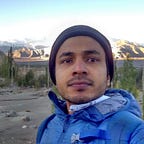Mathematics is a science which thrives purely on human thought without the need for external experiments and is a basic ingredient for all quantitative science. Its interesting to know that most of the mathematics is discovered just for intellectual delight without any immediate application in mind though its application may be found later. For instance mock modular forms discovered by Ramanujan in 1920 are now being used to study black holes. In 1900 David Hilbert published a list of 23 unsolved problems which set the mathematical agenda for the 20th Century. Some of them have been resolved, some have seen little or no progress but the first problem on the list stood out because of the sheer bizarreness of results that followed it. Its called the Continuum Hypothesis which concerns the most mysterious number, infinity.
The word infinity renders an image of something vast in our minds but the fact is, infinity is still infinitely bigger than our biggest imagination. How many counting numbers are there? Or how many points are there on a line? The answer to both the questions is infinite but are both these infinities of the same magnitude? In 1870 Georg Cantor showed that the infinity of points on a line which he named as ‘aleph one’ is of a higher order than the infinity of counting numbers and named it as ‘aleph zero’. Similarly the infinity of all possible curves that can be drawn on a paper is still of a higher order than aleph one and we can call it aleph two and continuing so on we get an infinity of infinities! This crazy idea, which saw an initial opposition from mathematicians has now become a usual playground for them. The first question that needs to be answered, without which the mathematics of infinity cannot take a step forward is whether there is any infinity bigger than aleph zero but smaller than aleph one. Believing that there isn’t any is called the continuum hypothesis (CH). This question which seems so simple and inviting at the first glance has taken the world of mathematics on a ride for more than a century now.
David Hilbert had announced these problems with the view that no matter how hard a mathematical problem is, in principle it has an answer. For example though it took more than three centuries of efforts of mathematicians to prove the Fermat’s last theorem but finally the problem got resolved. David Hilbert was in for a surprise when Kurt Gödel discovered the incompleteness theorem in 1931. This theorem demonstrated the inherent limitations of every axiomatic system governed by logical rules (Arithmetic is an axiomatic system). It stated that there will always be some statements about numbers within the system for which we cannot draw any conclusion. In 1940 Gödel using his theorem proved that CH cannot be disproved and in 1964 Paul Cohen proved that CH cannot be proved! Cohen was awarded a fields medal for his proof in 1966. It seems that infinity cannot be contained within the shackles of logic.
In Patanjali Yoga Sutras pramaana or looking for proof is just one of the modulations of the mind. Sri Sri Ravishankar says, “Truth cannot be understood through proof. Anything that can be proved can also be disproved. Truth is beyond proof or disproof. God is beyond proof. Proof is connected with logic, and logic is very limited in its purview.” Same has been the case with CH and infinity, mathematicians can now construct mathematical universes where CH is true and can also construct universes where CH is false. According to Sri Sri Ravishankar truth is not linear, it is spherical and anything that is spherical has to be contradictory. Love cannot be proved or disproved. We cannot infer love from someone’s actions or behaviour. Logic falls short of holding all that is precious in life but can we know infinity then? Sri Sri says “Feeling and experiencing infinity within this finite body, living timelessness within the time span of life — this is what you are here for.”
